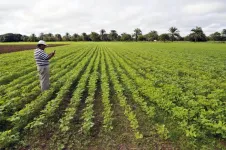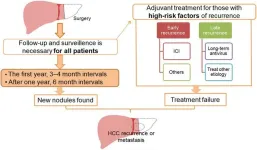(Press-News.org) Foreign direct investments (FDI) in tropical countries in extractive industries like mining, logging and fossil fuels have a long, environmentally destructive track record in tropical countries. Are FDI in food systems another extractive industry?
Highlights:
Foreign direct investment (FDI) in food systems are a major contributor to deforestation in tropical countries, an advanced machine learning model shows
Laws requiring deforestation-free exports are welcome but likely address only a fraction of forest loss potentially linked to FDI in food systems in domestic markets
Better regulation of FDI in domestic food production is needed to save more forest cover
FDI’s contribution to the “supermarketization” of diets in tropical regions is strongly linked to deforestation, pointing to the need for a food-systems-wide approach
Agriculture is the leading driver of deforestation, particularly in tropical countries that are home to some of the largest remaining tracts of intact primary forest. New regulations, particularly in Europe, aim to curb tropical deforestation in food supply chains. While the measures are welcome, they do not address the full extent to which FDI are linked to deforestation in global food systems.
New research examines underlying drivers of deforestation from a food system perspective in 40 countries. The researchers found that FDI and urbanization were primary drivers of tree cover loss, ahead of growth in GDP, population and exports. The research suggests that FDI contribute to deforestation and biodiversity loss through the “supermarketization” of global diets.
“Focusing only on exports is not going to have a major impact on tropical deforestation trends if that is the only thing we do,” said Janelle Sylvester, the study’s lead author and a researcher at the Alliance of Bioversity International and CIAT. “Domestic food consumption, which has changed due to FDI and urbanization, should also be recognized as a major driver of deforestation.”
The research tracked tree cover loss in 40 tropical and subtropical countries from 2004 to 2021 and ran key indicators through an advanced machine learning algorithm to parse the variables’ links to forest loss. The research was published in Scientific Reports on June 16.
The study is one of the first to use advanced machine learning to improve understanding of regional and global drivers of deforestation. The study is also unique because it uses a food system lens (as opposed to strictly a food production lens) to parse the drivers of forest loss.
The results challenge investors and policymakers to address FDI’s unacknowledged role in driving deforestation and other negative impacts on human and planetary health.
Focus beyond food exports
Food system research means taking into consideration everything related to food – from the land it’s grown on, to the often-faraway tables where it is consumed. In the study, researchers used 12 drivers encompassing food production, consumption and distribution.
Researchers analyzed the drivers using machine learning models (the eXtreme Gradient Boosting algorithm, or XGBoost) to determine how different drivers explained deforestation trends in the target countries and compared them with forest cover change data from Terra-i, a tool developed by the Alliance of Bioversity and CIAT. Models were constructed at the global scale and for Africa, Asia and Latin America.
The researchers found that trade dynamics, specifically foreign direct investments, and demand from urban areas were significant drivers of deforestation, particularly in Asia and Latin America. (Results from Africa suggested that deforestation was driven by factors outside the food system.)
“This suggests that to effectively reduce deforestation, we need to focus on improving the entire food system, not just how food is produced,” Sylvester said. “This study highlights the importance of addressing both local and global factors to protect forests and suggests that interventions targeting the food system could help achieve sustainable development goals.”
FDI’s outsized influence on deforestation may be explained by the global shift of food consumption habits toward ultra-processed food, which is highly dependent on ingredients produced on deforested land: palm oil, sugarcane, soy and other cereals to feed livestock for increasing meat consumption.
These dietary shifts are strongly tied to the FDI-driven “supermarketization” of food supplies, which are not only bad news for climate change and biodiversity loss but are increasingly contributing to malnutrition and associated diseases such as obesity and type-2 diabetes.
“This research has the potential to revolutionize our understanding of the leading causes of deforestation,” said Augusto Castro, a co-author from the Alliance. “This is a new way of putting all the pieces of deforestation together and developing new strategies to address it.”
FDI policy implications
FDI is a coveted source of income for developing countries and has long stirred debate about the extent of its potential benefits (increased employment, more competition to reduce consumer prices, tax revenue) and its potential tradeoffs (environmental degradation, exploitation and high government expenditure to attract investment). Maximizing the pros and reducing the cons is still a work in progress.
To help policymakers mitigate FDI-linked deforestation, researchers propose several considerations.
FDI proposals should be evaluated for environmental sustainability, and incentives like tax breaks or subsidies should encourage investments that are aligned with country priorities to reduce deforestation. Standards like the European Union Regulation on Deforestation-Free Products should be applied to foreign investors in domestic markets. Public awareness campaigns around health and sustainability should likewise be a focus in domestic markets.
“With urbanization, we become more disconnected from our food sources and have a lesser understanding of the environmental impacts and production practices linked to the food we’re eating,” Sylvester said. “It’s a narrative you hear a lot in developed countries, but it is happening now in low- and middle-income countries as well.”
FDI and land value
When demand for land increases, so does its monetary value. While not explicitly mentioned in the research, FDI, whether in food systems or not, have broader implications for infrastructure and other sectors that may also have impacts on land use, including deforestation.
“Future research will have to focus on how FDI causes land prices to change,” Castro said. “Land prices may be relatively inexpensive at the outset of an agricultural venture but are likely to increase over time. Investment in food production, whether for national or international markets, is also an investment in real estate. Therefore, we need to pay close attention to the long-term impacts of FDI on land prices and how expected changes in land prices affect land use dynamics.”
END
Foreign direct investments may fuel tropical deforestation
Foreign direct investments (FDI) in tropical countries in extractive industries like mining, logging and fossil fuels have a long, environmentally destructive track record in tropical countries. Are FDI in food systems another extractive industry?
2024-07-16
ELSE PRESS RELEASES FROM THIS DATE:
Timing is everything: Study finds link between bowel movement frequency and overall health
2024-07-16
SEATTLE – Everybody poops, but not every day. New research by the Institute for Systems Biology (ISB) suggests bowel movement frequency is linked to long-term health.
An ISB-led research team examined the clinical, lifestyle, and multi-omic data of more than 1,400 healthy adults. How often people poop, they found, can have a large influence on one’s physiology and health. Their findings will be published in the Cell Reports Medicine on July 16.
Researchers explored data from consenting participants of the consumer wellness company Arivale. The ...
Hormone therapy for breast cancer linked with lower dementia risk
2024-07-16
Hormone modulating therapy (HMT) used for the treatment of breast cancer was associated with a 7% lower risk of developing Alzheimer’s disease and related dementias later in life, according to a new study published today in JAMA Network Open.
The study, which is one of the largest of its kind, found that although HMT was linked with protection against the development of dementia overall, the association decreased with age and varied by race.
“Our findings emphasize the importance of being cognizant of individual patient factors when we prescribe medications or develop treatment plans for breast cancer,” said senior author Francesmary Modugno, Ph.D. M.P.H., ...
Alzheimer disease and related dementia following hormone-modulating therapy in patients with breast cancer
2024-07-16
About The Study: In this retrospective cohort study, hormone therapy was associated with protection against Alzheimer disease and related dementias in women age 65 or older with newly diagnosed breast cancer; the decrease in risk was relatively greater for Black women and women under age 75, while the protective effect of hormone-modulating therapy (HMT) diminished with age and varied by race in women. When deciding to use HMT for breast cancer in women age 65 years or more, clinicians should consider age, self-identified race, and HMT type in treatment decisions.
Corresponding ...
AI tool successfully responds to patient questions in electronic health record
2024-07-16
As part of a nationwide trend, many more of NYU Langone Health’s patients during the pandemic started using electronic health record tools to ask their doctors questions, refill prescriptions, and review test results. Many patients’ digital inquiries arrived via a communications tool called In Basket, which is built into NYU Langone’s electronic health record (EHR) system, EPIC.
While physicians have always dedicated time to managing EHR messages, they saw a more than 30% annual increase in recent years in the number of messages received daily, according an article by ...
New analysis of Cassini data yields insights into Titan’s seas
2024-07-16
UNDER EMBARGO UNTIL JULY 16, 2024, AT 11:00 AM ET
ITHACA, N.Y. – A new study of radar experiment data from the Cassini-Huygens mission to Saturn has yielded fresh insights related to the makeup and activity of the liquid hydrocarbon seas near the north pole of Titan, the largest of Saturn’s 146 known moons.
The key takeaway: Using data from several bistatic radar experiments, a Cornell University-led research team was able to separately analyze and estimate the composition and roughness of Titan’s sea surfaces, something previous analyses of monostatic radar data were unable to achieve. This will help pave the way for future combined ...
New sleep study aims to understand cognitive decline in women
2024-07-16
LA JOLLA, CA—Alzheimer’s disease, the most common type of dementia, currently affects twice as many women as men, with minority populations predicted to witness the most significant increase in cases in the coming years, according to the Centers for Disease Control and Prevention.
Disturbances in sleep are well-known in dementia but have previously been explained as an outcome of the disease, not the cause. Increasing evidence, however, now implicates sleep disturbances with the development of dementia.
In a bid to better understand the relationship between sleep and cognitive outcomes in women, scientists at the Scripps ...
Turning agricultural trash to treasure
2024-07-16
In California's Northern San Joaquin Valley, agricultural leftovers such as almond shells, fruit peels, and orchard trimmings can potentially be converted into sustainable bioproducts and biofuels – with the right technology. Today, Schmidt Sciences’ Virtual Institute on Feedstocks of the Future awarded new funding to a group investigating how to make better use of the diverse agricultural waste in the region.
The group, “Building the Circular Bioeconomy in the North San Joaquin Valley” or BioCircular Valley, is co-led by the Department of Energy’s Lawrence Berkeley National Laboratory (Berkeley Lab), UC Berkeley, and BEAM Circular, ...
Adjuvant therapy for hepatocellular carcinoma after curative treatment: Several unanswered questions
2024-07-16
Hepatocellular carcinoma (HCC) is one of the most prevalent malignancies globally and is the third leading cause of cancer-related deaths. The primary curative treatments for HCC are liver transplantation, hepatectomy, and local ablation. However, the recurrence rate of HCC following hepatectomy or ablation remains alarmingly high, up to 70%, severely impacting patient prognosis and overall survival (OS). To mitigate postoperative recurrence and improve patient outcomes, various adjuvant therapies have been explored. Despite the efficacy of several adjuvant treatments in reducing recurrence rates and enhancing survival, ...
Palliative care is underutilized in nursing homes
2024-07-16
INDIANAPOLIS – Palliative care, specialized medical care focusing on providing relief from the symptoms -- including pain -- and the stress of serious illness, is underutilized in nursing homes, despite the large number of nursing home residents living with a serious illness such as cancer, dementia, Parkinson’s disease, heart failure or chronic obstructive pulmonary disease.
A qualitative study, published in the Journal of the American Geriatrics Society, analyzes lack of palliative ...
Understanding others: By age three, we can do this with mirror neurons
2024-07-16
Milan, July 15, 2024 – By the age of three, children are capable of understanding others, "mirroring" those they are with to imitate and anticipate their intentions. They are able to do it thanks to the sophisticated neurofunctional architecture that is necessary to understand others' intentions, the mirror neurons, that result already active at this age.
It’s the result of a study published in the prestigious journal PNAS, led by the collaboration between Giacomo Rizzolatti of the University of ...
LAST 30 PRESS RELEASES:
Evidence behind intermittent fasting for weight loss fails to match hype
How AI tools like DeepSeek are transforming emotional and mental health care of Chinese youth
Study finds link between sugary drinks and anxiety in young people
Scientists show how to predict world’s deadly scorpion hotspots
ASU researchers to lead AAAS panel on water insecurity in the United States
ASU professor Anne Stone to present at AAAS Conference in Phoenix on ancient origins of modern disease
Proposals for exploring viruses and skin as the next experimental quantum frontiers share US$30,000 science award
ASU researchers showcase scalable tech solutions for older adults living alone with cognitive decline at AAAS 2026
Scientists identify smooth regional trends in fruit fly survival strategies
Antipathy toward snakes? Your parents likely talked you into that at an early age
Sylvester Cancer Tip Sheet for Feb. 2026
Online exposure to medical misinformation concentrated among older adults
Telehealth improves access to genetic services for adult survivors of childhood cancers
Outdated mortality benchmarks risk missing early signs of famine and delay recognizing mass starvation
Newly discovered bacterium converts carbon dioxide into chemicals using electricity
Flipping and reversing mini-proteins could improve disease treatment
Scientists reveal major hidden source of atmospheric nitrogen pollution in fragile lake basin
Biochar emerges as a powerful tool for soil carbon neutrality and climate mitigation
Tiny cell messengers show big promise for safer protein and gene delivery
AMS releases statement regarding the decision to rescind EPA’s 2009 Endangerment Finding
Parents’ alcohol and drug use influences their children’s consumption, research shows
Modular assembly of chiral nitrogen-bridged rings achieved by palladium-catalyzed diastereoselective and enantioselective cascade cyclization reactions
Promoting civic engagement
AMS Science Preview: Hurricane slowdown, school snow days
Deforestation in the Amazon raises the surface temperature by 3 °C during the dry season
Model more accurately maps the impact of frost on corn crops
How did humans develop sharp vision? Lab-grown retinas show likely answer
Sour grapes? Taste, experience of sour foods depends on individual consumer
At AAAS, professor Krystal Tsosie argues the future of science must be Indigenous-led
From the lab to the living room: Decoding Parkinson’s patients movements in the real world
[Press-News.org] Foreign direct investments may fuel tropical deforestationForeign direct investments (FDI) in tropical countries in extractive industries like mining, logging and fossil fuels have a long, environmentally destructive track record in tropical countries. Are FDI in food systems another extractive industry?


